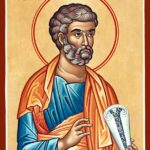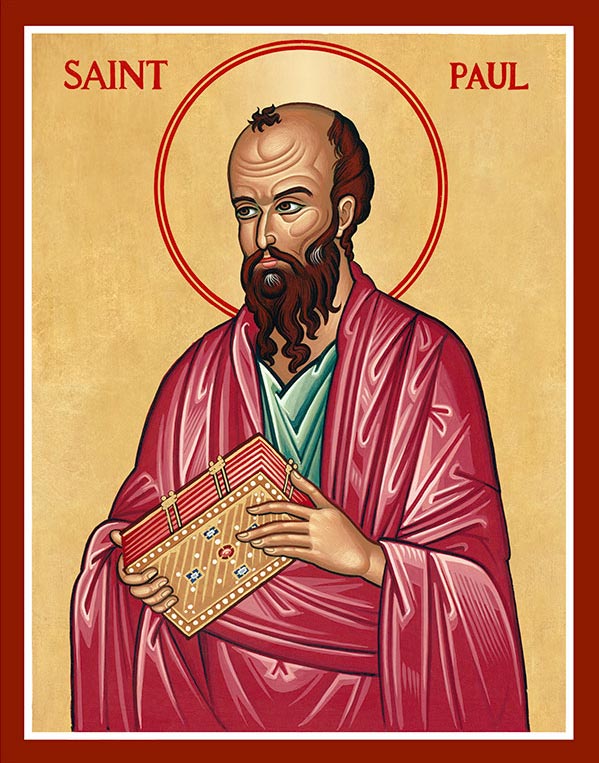
Saint Peter
December 27, 2023Hos Erof – Grades 1-2
January 1, 2024
Saint Peter
December 27, 2023Hos Erof – Grades 1-2
January 1, 2024Saint Paul the Apostle
Saint Paul was an apostle who taught the gospel of Christ to the first-century world.

His name was “Saul of Tarsus” before his conversion to Christianity. He is also called: “Our teacher Paul the Apostle, the tongue of perfume.”
Paul, the great apostle to the nations. His Hebrew name was Saul of Tarsus , which means “wanted.” He was called by this name in the Book of Acts until (Acts 13:9) , where it was said, “But Saul, who is also Paul.” From that time until the end of the Book of Acts, he was called Paul, meaning “the little one.” Some thought that he took the name from Sergius Paulus, the governor of Cyprus, but this is very unlikely. But the prevailing opinion, which is correct, is that Saul had another name known to the Gentiles, which was Paul, and two names were mentioned by some Jews (Acts 1:23; 12:12; Colossians 4:11).
The Apostle Paul was born in Tarsus in the province of Cilicia , part of the Roman Empire, where he spent his childhood. From his obtaining the Roman pastorate (Acts 22: 25-29), we conclude that he was from a noble family, at least not poor, and influential, for in (Romans 16: 7, 11) we find him sending greetings to three of his relatives, and it appears that the first two converted to Christianity before him. From (Acts 23:16) we know that his sister’s son conveyed to him the news of the conspiracy against him. It is possible that he was an employee or someone with influence that made him know such secrets. The honor and influence he gained in the Sanhedrin and among the Jewish leaders (Acts 9: 1, 2; 22: 5; Phil 3: 4-7) indicate the honor of his rank.
His father was a Pharisee from the tribe of Benjamin (and Paul was also a Pharisee ) and he was raised according to the narrow law (Acts 23:6; Philippians 3:4-7), but he was born enjoying Roman pastoralism.
Tarsus was a center of mental refinement. There are many institutes of science and education. It was a center for Stoic philosophy , whose influence appeared in many of the Prophet’s expressions of Christian principles. It has been said before that it is necessary for him to be familiar with sacred history from the Bible and the history of the Jews from tradition at a young age. Like all Jewish boys, he learned a craft that he could use if needed. The craft that Paul learned was making tents (Acts 18:3), so this does not indicate poverty or lowliness. When he completed what he could in Tarsus , he was sent to Jerusalem , the capital of Judea , to study the law . (See more about this topic here on St. Takla’s website, in the pages of the Bible Dictionary and other sections.) From (Acts 23:3) we know that he was raised at the feet of Gamaliel , and that he was one of the most famous teachers and interpreters of the law . Thus, with his knowledge, knowledge, and preparation, he became more qualified and competent to preach. He was more qualified than other apostles to intervene and preach among the Jews, Greeks, Romans, and barbarians. It appears that Saul went to Jerusalem at his young age (Acts 26:4) and that he was 20 or 22 years old when our Savior began to reveal himself to the people.
The first mention of Paul in (Acts 7:58) was that the witnesses in the trial of Stephen “took off their clothes at the feet of a young man called Saul,” which indicates, along with what was stated in (Acts 8:1), that he was an influential person and that he was satisfied with his killing, meaning that he was, Most likely, he was among those mentioned in (Acts 6:9) who brought the accusations against the first martyr. He appears here as a fanatic, who hates the idea that the crucified person is the Messiah and believes that his followers were a religious and political danger. With a clear conscience, he did a great deal in trying to bring these people back or cut off their roots (Acts 8:3; 22:4; 26:10, 11; 1 Corinthians 15:9; Galatians 1:13; Philippians 3:6; 1 Timothy 1:13) This persecution was cruelly carried out by someone provoked by a deluded conscience. Not only did he attack the followers of that path in Jerusalem, but he pursued them outside it. In all of this, he thinks that he is performing a service to God and the law.
It was on the way to Damascus , in the middle of the day, when a light from heaven flashed around him, and he fell to the ground (Acts 9:3) . And there were men with him who stood silently listening to the voice (Acts 9:7), even though they did not recognize the words (Acts 22:9) . Saying, “It is difficult for you to kick against the goads ,” we suggest that Saul must have been wondering within himself, “Couldn’t this crucified be the Messiah? Otherwise, how could he explain their empowerment with this belief to the point of death?” From (Acts 22:20) it appears that Stephen's zeal, patience, and courage to endure would not have been in his power if a secret force had not found his cooperation. His conscience was pricking him, and the call came to him. He responded sincerely, and he was born again. The incident was mentioned by Luke the Evangelist in (Acts 9: 3-32) and Paul himself mentioned it twice in (Acts 22: 1-16; 26: 1-26). In his letters, Paul alluded to the subject with simplicity and sincerity (1 Cor. 9:1; 15:8-10; Gal. 1:12-16; Eph. 3:1-8; Phil. 3:5-7; 1 Tim. 1:12-16; 2 Timothy 1:9-11) which proves the truth of the matter and dispels all doubt about it. It is also certain that the Lord Jesus not only spoke to Paul, but also appeared to him and saw him with his own eyes (Acts 9:17, 27; 22:14; 26:16; 1 Corinthians 9:1), and while the form that Paul saw is not clear However, it was certain and clear, which made it true that Jesus is the Son of the living God, the Redeemer of humanity (Acts 26:19) . Saul was not under any mental influence or hysterical imagination, but rather he heard action and saw action, then he lived for a long time repeating and clarifying his conviction, and he endured what he endured with contentment, confidence, and patience (2 Timothy 4:7, 8) until the end of his days.

